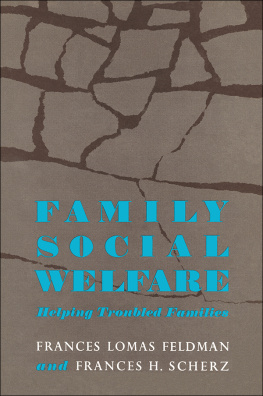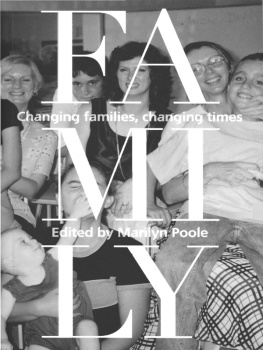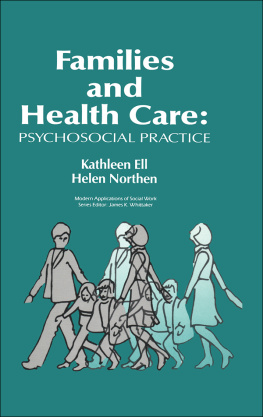First published 2006 by Transaction Publishers
Published 2017 by Routledge
2 Park Square, Milton Park, Abingdon, Oxon OX14 4RN
711 Third Avenue, New York, NY 10017, USA
Routledge is an imprint of the Taylor & Francis Group, an informa business
Copyright 1967 by Atherton Press.
All rights reserved. No part of this book may be reprinted or reproduced or utilised in any form or by any electronic, mechanical, or other means, now known or hereafter invented, including photocopying and recording, or in any information storage or retrieval system, without permission in writing from the publishers.
Notice:
Product or corporate names may be trademarks or registered trademarks, and are used only for identification and explanation without intent to infringe.
Library of Congress Catalog Number: 2006045530
Library of Congress Cataloging-in-Publication Data
Feldman, Frances Lomas.
Family Social welfare : helping troubled families / Frances Lomas Feldman, Frances H. Scherz.
p. cm.
Originally published: New York : Atherton Press, 1967.
Includes bibliographical references (p. ) and index.
ISBN 0-202-30906-1 (alk. paper)
1. Family social work. I. Scherz, Frances H. II. Title.
HV697.F4 2007
362.82'53dc22
2006045530
ISBN 13: 978-0-2023-0906-4 (pbk)
WE ARE ENTERING a new socioeconomic system. Its requirements are as different from those at the inception of the industrial revolution as those of the emerging industrial revolution were different from agrarian life in feudal times. During the age of feudalism human skills were combined with human and animal power in a system that provided a minimal standard of living for the vast majority of the people. In the developing industrial revolution, human skills were combined with machine power to provide great wealth for a few, a reasonable standard of living for a large proportion of the population, and abject poverty for those unable to find a place within the productive system.
The new socioeconomic system is, in large measure, the response to the acceleration of the technology of automation and mechanizationan acceleration paralleling increased legal and social emphasis on the civil rights of millions of citizens whose economic and educational attainments pin their employment opportunities to a rapidly obsolescing socioeconomic order. And like the upwardly mobile householder who, in moving from one dwelling to a better one, suddenly discovers that his old furniture is either too unsteady to withstand the move or too shabby to be placed among the new and modern household appliances and appurtenances marking his growing affluence and social status, socioeconomic crisis in the United States becomes more apparent as the nation stands on the threshold of a changed socioeconomic system.
The manifestations of this crisis are paradoxical: millions of Americans living in poverty and deprivation in the midst of general prosperity enjoyed by the majority of citizens; a relatively high level of unemployment while many jobs go unfilled; social unrest derived from the social and economic disadvantage which is the lot of large segments of population in a democratic nation founded upon principles of liberty, equality, and opportunity.
Perhaps the greatest paradox is this: Although people on the whole are benefiting from technological and scientific progress, they also are increasingly alienated from each other in the human sense because technological advancement reduces the necessity for people to rely on each other for goods, services, and human relationships. Yet the basic need for human relationships continues to exist. Somehow a bridge must be found, a balance must be struck between a mechanized and a human world.
It is the purpose of this volume to describe the place of the family in this world, to identify the familys tasks, its common human needs and problems, and the resources essential to help families meet common and uncommon difficulties.
Because human needs outstrip facilities, programs, and personnel with specific knowledge and skills to provide the help required to meet these needs, this volume also intends to make available, in pragmatic and usable form, knowledge about human behavior and ways of dealing with it that many helpers with diverse educational and experiential backgrounds, knowledge, and skills will find useful in the performance of their respective tasks.
The focus in this volume is upon understanding the family, and work with the family (or segments of families), regardless of the institutional or agency setting in which such work is carried ona focus growing from the fact that people are people whether their troubles have come to the attention of a school, a family agency, or a medical clinic.
This focus recognizes the family as the core unit in American society, with each family group and its members maintaining a reciprocal relationship with society that is essential to the well-being not only of the individual family but also of the community and of the nation as a whole. It recognizes that the adequate social functioning of the family members in our modern world requires a family climate conducive to appropriate psychological and physical development of the individual members. And it recognizes that such development is influenced by environmental and cultural factors surrounding and impinging upon family lifethat the real world in which family members must function contains stresses with which they need to cope: competition in the labor market, fluctuations in the availability and costs of goods and services, war-related tensions, changing societal attitudes and demands in many forms.
Accordingly, the focus upon understanding the family, the individual and intra-family behavior, and the relationship of such behavior to coping with the continuing and changing socioeconomic conditions or circumstances of todays society, takes into account that not all families are able to cope equally or adequately with the stresses that originate either internally (that is, within the family or within a family member) or in the external world. Also it takes into account the fact that, regardless of the kind of agency or setting in which the family members are encountered, certain understandings must be brought to the work with the family and its members to enable them to gain mastery of their affairs: a mastery satisfactory to themselves and acceptable to the community at large.
The think pieces comprising this volume emerge from the experiences, observations, research, and thinking of the authors. Their intent is to provide, in relatively nontechnical fashion, information about human behavior that is normal or that, in response to various forms of stress, is deviant. Some guides, or steps, are suggested whereby those in helping positions may move constructively toward the alleviation or resolution of family problems: motivating or encouraging the troubled family (or the family that is untroubled but creating trouble for the community) to work toward the attainment of goals that seem desirable to the family and the surrounding community, and helping the family to use internal and external strengths and resources in achieving sub-goals en route to the major one.





